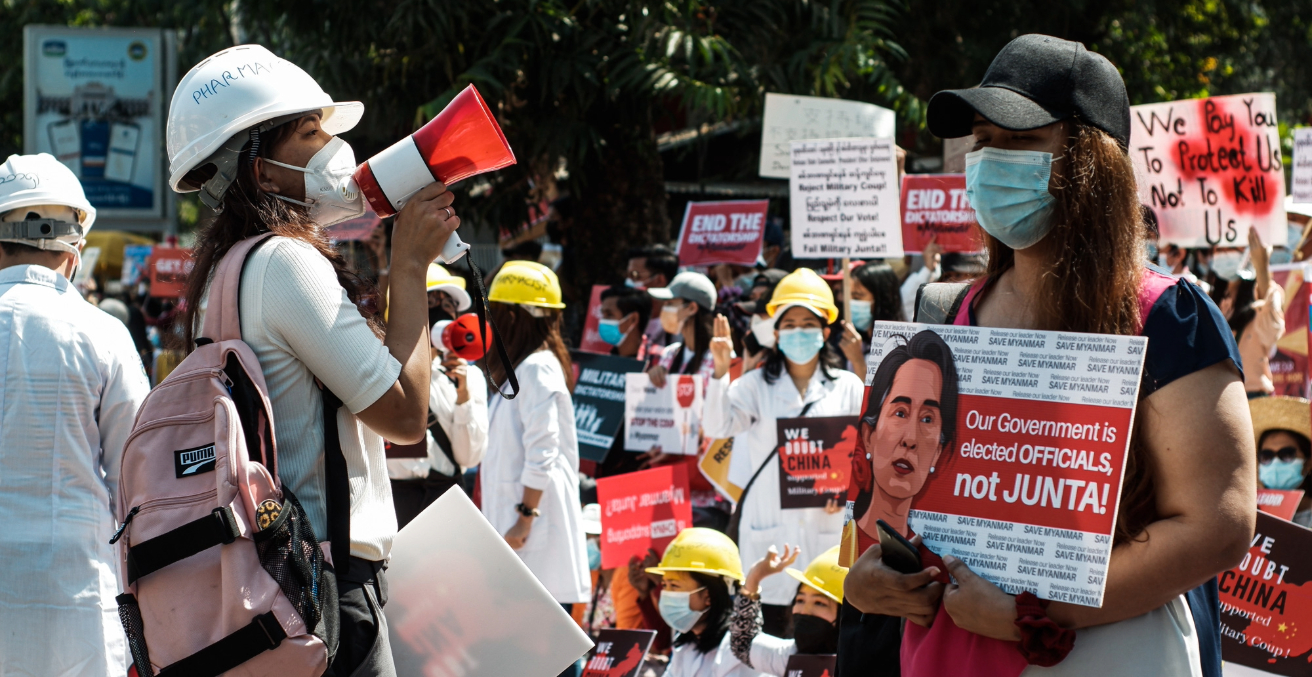Since US recognition of Bangladesh’s independence in 1972, the trajectory of the relationship has witnessed a consistent upward trend. In 2022, both countries celebrated the auspicious event of 50 years bilateral relations.
For the last two decades, the US focused its attention mostly toward the Middle East. Hence, it had a limited focus on South Asia. However, with the 2018 revival of the Quadrilateral Security Dialogue (Quad) and the subsequent development of the Indo-Pacific concept, the US has renewed its focus on South Asia and has emerged as one of the crucial actors in the region.
Current Trends
Bangladesh and the US have always shared favourable relations, however US sanctions on the Rapid Action Battalion, a special forces security unit, in December 2021 surprised many and immediately took over the narrative in Dhaka. What is important at this juncture was that leaders in Dhaka responded, perhaps counterintuitively, by bolstering diplomatic relations with Washington. Assistant Secretary of State for South and Central Asian Affairs Donald Lu praised Bangladesh for its “tremendous progress” in this regard.
Regular diplomatic communications and state-level visits are increasingly taking place. In the last two years, 18 mid- and high-level visits have occurred. Foreign Minister Abul Kalam Abdul Momen met with his counterpart, Secretary of State Antony Blinken, in 2022. Further visits to the US have included seven Bangladeshi delegations, with eleven US delegations visiting in return, including the latest visit by Rear Admiral Eileen Laubacher and Assistant Secretary Lu.
Both countries share mutual interests in counterterrorism, climate change, Rohingya repatriation, and liberal values. Additionally, authorities in Bangladesh and the US share the same views on Rohingya ethnic cleansing. On Ukraine, Bangladesh maintains a neutral political stance and complies with US sanctions. The recent events of the Ursa Major controversy can be mentioned in this regard. Ursa Major is a US-sanctioned ship that changed its name to Sparta-3 and carried goods for Bangladesh’s nuclear power plant but was not allowed to berth and was subsequently turned around by authorities.
Increasing cooperation among the countries can be easily identified through several dialogues and joint training programs that have taken place in the last two years. Bangladesh and the US held the Partnership Dialogue and Security Dialogue in 2022 after a pause due to the pandemic. The dialogues are annual arrangements between the countries and have taken place every year since 2012. The US Navy also attended Bangladesh’s International Fleet Review in December 2022.
Apart from this engagement, political dissatisfaction is also a part of the relations. The US is dissatisfied with the internal political situation of Bangladesh, while leaders in Dhaka also see such intervention as contradictory to diplomatic norms. The issue began when the US Mission in Dhaka gave statements that created a perception the US was supporting the opposition in politics. The government perceived this as meddling in internal affairs of the state – in contradiction of the Vienna Convention. However, it seems that through Lu’s latest visit, both countries have had the chance to share their perspectives through diplomatic communication, and the issue has largely abated.
On the economy, Bangladesh and the US share complex interdependence. Bilateral trade is growing fast, reaching US$13 billion in 2022. In 2021, it was $10.5 billion, and in 2020 it was $7.8 billion. Bangladesh also has a surplus of $7.78 billion. Such burgeoning trade has also made the US the third-largest trading partner for Bangladesh behind China and India. The US is also the single largest market for the country’s ready-made garment exports – the main export product worth $46.6 billion in 2022. The US is the largest investor in Bangladesh’s energy sector and the largest source of foreign direct investment more generally. Moreover, Bangladesh is also the third-largest recipient of US aid in South Asia.
During the pandemic, the US donated more than 100 million vaccine doses to Bangladesh, a number that accounts for more than 70 percent of all international COVID-19 vaccine donations. US vaccines played an instrumental role in Bangladesh’s national inoculation process.
This goodwill has translated into greater favourability ratings among the Bangladeshi people toward the US. While the last Pew Research in 2014 showed that 76 percent of Bangladeshis held a favourable view toward the US, this has likely increased since COVID-19. The historic people-to-people relationship began during the independence war, when US citizens collected funds for Bangladesh’s independence. Currently, more than 220,000 Bangladeshis lives in the US. This large diasporic community is contributing to both US society and economy.
Indicatively, America is very popular among the Bangladeshi people, particularly those who seek to pursue higher studies. The US offers several scholarship and skilled migration schemes for Bengladeshi applicants, including the popular Fulbright award. Immediately after the pandemic, more than 10,500 Bangladeshi students went to the US for education, the highest among the countries where Bangladeshis pursued higher studies.
Issues of Priority
In Washington, authorities want Bangladesh to align itself more with US principles on human rights and democracy. For leaders in Bangladesh, the balancing act between seeking friendship while not giving into demands has been difficult. The sanctions against the RAB and its seven officials also came as a part of US human rights policy, and many see such efforts as a coercive method to have Dhaka join a US-led bloc against China. The US also wants to sign two defence agreements with Bangladesh, namely the General Security of Military Information Agreement (GSOMIA) and the Acquisition Cross-Servicing Agreement, in its search to strengthen security in the Indo-Pacific region. Washington also wants Bangladesh to join in its Indo-Pacific Strategy (IPS), which many see as aimed at countering China. This is difficult for leaders who want to balance economic interests with both China and the US. So far, Dhaka has not rejected these proposals, and it is currently “studying” the IPS.
Leaders in Bangladesh are keen to focus on US investment and bilateral trade. The suspended Generalised Scheme of Preferences (GSP) is also on Bangladesh’s agenda. The GSP is an arrangement under which Bangladesh enjoys duty-free access to the US market. This arrangement ceased in 2013, though leaders in Dhaka are hopeful that it might begin again for them.
Future Prospects
As Bangladesh is a tiger economy with a good investment environment, there are strong prospects that bilateral trade and investment will increase in coming years. Bangladesh has identified information communications technology as its “thrust” sector and wants US investment to help it evolve. This will no doubt diversify US investment in Bangladesh. Moreover, Bangladesh has accepted the draft of GSOMIA, meaning potential new sources for defense procurement from the US, benefitting Bangladesh’s Forces Goal-2030.
In summation, the individual sanctions have been limited, suggesting that recent disputes are short-term and not impactful. Beyond the disputes, both countries have mutual interests that are likely to increase in political and economic alignment. Diplomatic engagement and the deepening of relations can be helpful in this context. The reciprocal diplomatic visits over the last two years have been fruitful and have helped to transform the relationship. This should continue.
Shafiqul Elahi is a retired government official in Bangladesh, currently pursuing a career in academia. His first book, Institutional Development and Bangladesh, is forthcoming. Elahi often contributes to news and analysis portals including Modern Diplomacy, The Geopolitics, Newage, Daily Sun, Daily Observer, and Bangladesh Post.
This article is published under a Creative Commons Licence and may be republished with attribution.




